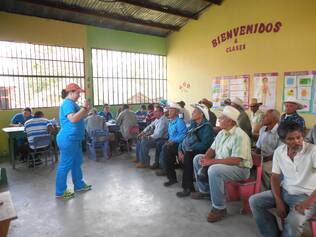Knowledge is power, but for poor people living in remote areas, access to knowledge is severely limited. For example, the Honduran families living in 124 small communities in the remote Locomapa region of mountainous Honduras, (about 3 hours by public bus to a city), live with virtually no access to information about improving or protecting their health. No television. No internet. No mail. No periodicals. And on average, adults who participate in our cancer screening programs have about 4 years of education.
In Honduras, Dartmouth Cancer Center works with two strategies to bring key cancer prevention information to rural residents:
- At our brigade-style, integrated, multi-organ cancer screening events conducted in collaboration with the Honduran Liga Contra Cancer, education modules about cancer prevention are built into the screening experience. The modules include the topics of how to examine your breasts, what the prostate does, why smoking is bad for your health, and tactics to reduce family exposure to agricultural chemicals. The modules are taught by Honduran medical students from the University Católica de Honduras or Honduran clinicians.
- Dartmouth undergraduates involved with ACTS Honduras held a week-long leadership program for 50 rural Honduran teens focused on building the skills the teens will need to lead their small rural communities. For 10 years, the curriculum has included cancer prevention in a train-the-trainer model where the teens learn key prevention information and are deployed across the communities to share the information in unusual ways. Over time, they have developed expertise in educating about condom use to prevent HPV and techniques to prevent family contamination by farmers' use of agricultural chemicals like pesticides. Their modes of public health outreach have included writing and performing skits, poster exhibits, constructing safe chemical storage boxes and providing them to families, and writing teaching aids.
